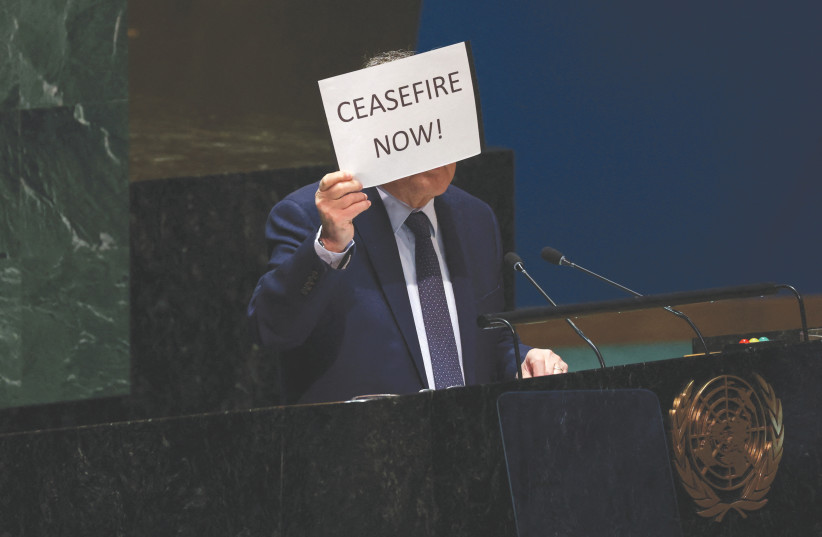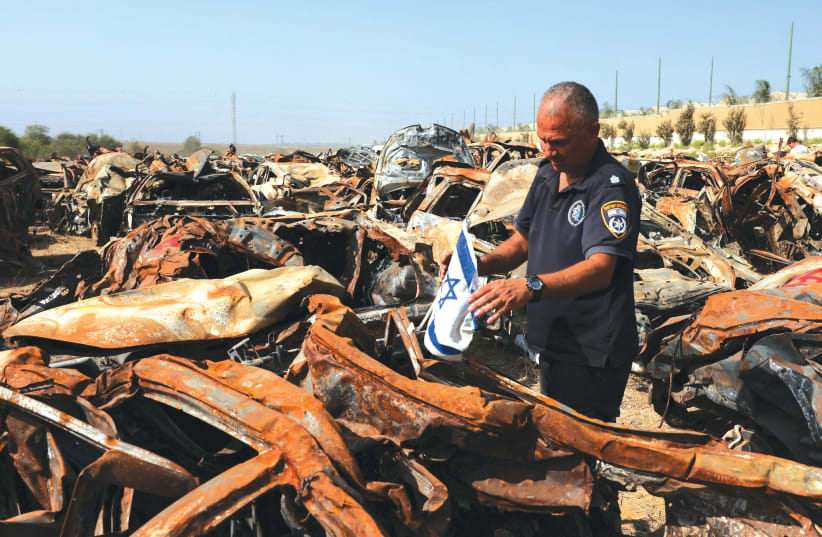Those who are calling for an end to the fighting between Israel and Hamas have clearly forgotten that there was a ceasefire between the two parties until the morning of October 7, when thousands of terrorists invaded Israel, murdering, beheading, raping, and mutilating hundreds of Israelis. The terrorists also kidnapped more than 240 people, half of whom are still being held hostage in the Gaza Strip.
It was Hamas, not Israel, that breached the ceasefire. This war was not initiated by Israel. The war was imposed on Israel, which had no choice but to remove the terrorist threat from its border with the Gaza Strip. There is a consensus that this is one of the most justified wars since 1948. This is a war to defend our home.
That’s why it would be very difficult to find Israelis who support the idea of a ceasefire or a hudna (temporary truce) that will allow Hamas to remain in power. For these Israelis, a ceasefire is tantamount to a Hamas victory. A war that ends without the total destruction of Hamas will be seen by many Arabs as a defeat for Israel and a victory for Iran and its terror proxies, including Hamas.
For Israelis, a ceasefire equals a Hamas victory
More than 100 days after the eruption of the war, Hamas leaders are apparently beginning to understand that Israel is more determined than ever to achieve the two goals of the war: ending Hamas’ rule over the Gaza Strip and the release of the remaining hostages. They are also finally realizing that this war is different from all the previous rounds of fighting between Israel and Hamas. Those mini-wars were limited in time and always ended in Egyptian and Qatari-brokered ceasefires.
It’s safe to assume that as in the past, this time too, Hamas is interested in a ceasefire. Hamas, however, wants a permanent ceasefire that would end the war and allow the terrorist group to remain in power. Hamas, in other words, is saying: “Let’s go back to the pre-October 7 era when we had a ceasefire.” Its leaders are no longer talking about a temporary truce. They are so worried that they will lose their grip on the Gaza Strip that are searching for a way to end the war. This is something that Israel cannot afford for a number of reasons.

FIRST, THE Israel Defense Forces (IDF) have still not destroyed most of Hamas’ military infrastructure. Second, although nearly 9,000 Hamas members have been killed since the beginning of the war, it is believed that there are still 15,000-20,000 more terrorists operating in different parts of the Gaza Strip. Third, Israel has yet to release the hostages, and it seems that the only way to do so is by stepping up the military pressure.
Hamas is not seeking a ceasefire because it is concerned about the rising number of Palestinian casualties. If it cared about the well-being and safety of the Palestinians, it would not have launched its genocidal attack on Israel. If it cared about its constituents, it would have built bomb shelters for them instead of building tunnels for its leaders.
Recently, senior Hamas official Mousa Abu Marzouk stated that “the underground tunnels built in the Gaza Strip are to protect the Hamas ‘fighters’ and the responsibility to protect the civilians is with the United Nations and Israel.” Such statements demonstrate the Hamas leaders’ indifference towards the suffering of their own people. And we haven’t yet talked about the tens of millions of dollars that the terror organization has invested in stockpiling weapons and digging tunnels instead of building schools and hospitals and providing work opportunities.
Hamas official said that UN and Israel must protect civilians
Hamas leader Yahya Sinwar, one of the masterminds of the October 7 massacre, is said to be holding the key to ending the war with Israel. He is the only one who can put an end to the war by releasing all the Israeli hostages and ordering his men to surrender. But Sinwar, who speaks fluent Hebrew, fully understands that this could be his last battle. As someone who is said to follow the news from Israel very closely, he has been hearing the voices of Israelis calling for his elimination.
Nevertheless, he is unlikely to release the hostages unconditionally. Nor is it realistic to expect a psychopath like Sinwar to instruct his Hamas terrorists to lay down their weapons and hand themselves over to the IDF.
His only hope now is that international pressure will compel Israel to accept an end to the war. American and European officials who repeatedly urge Israel to agree to a ceasefire before it has achieved its goals are actually sending a reassuring message to Sinwar and other Hamas leaders, namely that it is worthwhile holding on for a little longer because Israel will eventually bow to the pressure.
When Hamas sees many Western countries and officials pressing Israel to stop the war, this encourages the terror group to harden its position and come up with even more demands. If until recently it was willing to accept a temporary truce, it is now demanding an absolute end to the war and a full withdrawal of the IDF from Gaza. Moreover, Hamas now has the audacity to demand international guarantees that it will remain in power and that Israel will not target its leaders.
Hence, it’s no surprise that Hamas leaders rejected the recent Israeli offer of a two-month lull in the fighting in return for the release of the hostages. Israel, according to the proposal, was even prepared to release a large number of Palestinian prisoners. Still, Hamas reportedly turned down the offer because it is still dreaming of returning to the pre-October 7 status quo.
IT’S ESSENTIAL, too, to understand the broader significance and the possible consequences. Israel cannot afford to stop the war before it restores its deterrence. Since October 7, Israel has been seen as weak and vulnerable. Its enemies are convinced that the countdown to Israel’s destruction has begun. A ceasefire without an absolute win over Hamas would send the wrong message to its patrons in Iran, which poses an existential threat to Israel, actively coordinated with its proxies throughout the region: Hamas, Hezbollah, Palestinian Islamic Jihad (PIJ), and the Houthis.
Israel must restore deterrence
If the international community is truly interested in ending the war in Gaza, it should exert pressure on Hamas, not on Israel. Those who are calling for a ceasefire should at least demand that Hamas, immediately and unconditionally, release all the hostages. They should also demand that the terror group disarm and relinquish its control over the two million Palestinians in the Gaza Strip. No Israeli will accept a ceasefire or an end to the war that would keep Hamas terrorists a few hundred yards away from their homes and communities.
It seems that the international community has not yet grasped that the Israel of today is not the Israel of October 6. Israelis have learned, the hard way, that truces have a nasty way of blowing up in their faces.
The writer served in the Foreign Ministry and is a former senior adviser to Israel’s ambassador in the UAE. She is a specialist on the Abraham Accords and a strategy and communications consultant in the MENA region.
